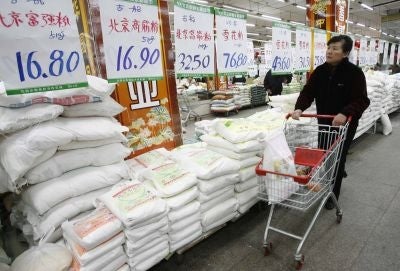GM rice found in Chinese supermarkets: Greenpeace

Genetically modified rice is being sold in supermarkets in China including US retail giant Wal-Mart, environmental group Greenpeace said in a report that contradicts government statements.
The study said GM rice was being sold in Wal-Mart stores in Hunan and also a Chinese supermarket chain in the central province.
China's government said late last year it had approved initial production licences for genetically modified strains of rice and corn, but that commercial cultivation required further approval.
China has so far not approved imports of such grain.
The Greenpeace study - conducted last October and November in nine supermarkets in eight cities across the country - also found many stores were selling fruits and vegetables tainted by banned pesticides.
The tainted produce included cowpeas, cucumbers and strawberries, said the report, which was released on Monday.
Officials at Wal-Mart could not immediately be reached by AFP for comment.
The agriculture ministry posted a statement on its website Tuesday which referred to "reports" of GM rice sales, saying they still had not been approved by the government.
It did not independently confirm GM rice was on the market but called on authorities to look into the reports.
The issuance of GM production licences last year was seen by experts as paving the way for future commercial grain cultivation that could possibly boost yields and help the world's most populous nation avoid food shortages.
China said in 2008 that it aimed to cultivate high-yield, pest-resistant genetically modified grains as it faces the challenge of feeding its 1.3 billion people and battles both shrinking arable land and climate change.
China is a major producer of genetically modified cotton and vegetables such as peppers and tomatoes.
But Greenpeace China has said the commercialisation of genetically modified rice was a "dangerous genetic experiment" and called on Beijing to make public the health and environmental studies used in the certification process.
Join our commenting forum
Join thought-provoking conversations, follow other Independent readers and see their replies
Comments